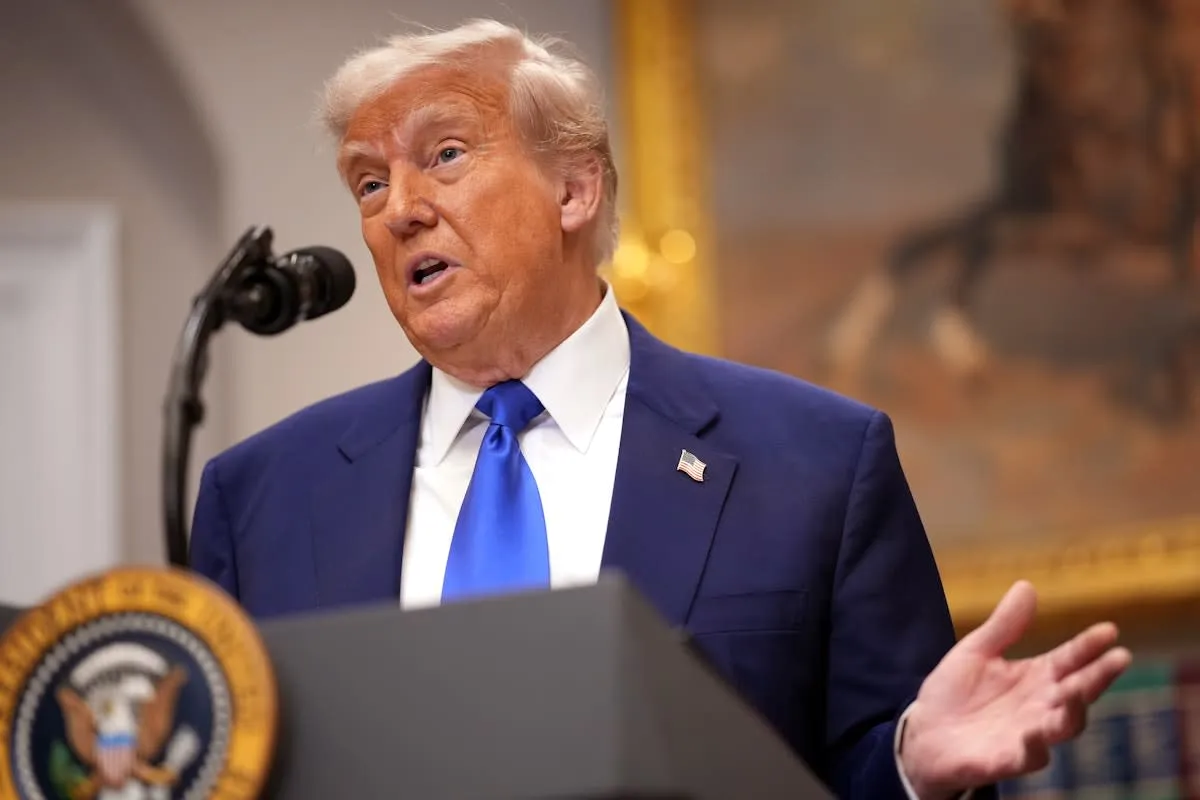
Trump Floats 200% Tariffs on Pharma Imports, Offers Industry One-Year Grace Period
In a move that could significantly reshape the pharmaceutical supply chain and global drug trade, President Donald Trump announced Tuesday that imported pharmaceutical products could face tariffs of up to 200%. The announcement, made during a cabinet meeting, signals a continuation of Trump’s hardline economic stance during his second term—this time targeting the pharmaceutical industry and its longstanding reliance on foreign manufacturing.
While the potential for such steep tariffs rattled some market observers, others interpreted the announcement more cautiously. Wall Street analysts, including those at Leerink Partners, viewed the news as a “positive” development—primarily because of the extended grace period and the uncertainty surrounding whether the administration will ultimately implement the proposed tariffs at all.
We’re going to give people about a year, a year and a half, to come in,” President Trump told reporters, referring to pharmaceutical manufacturers and importers. “We’ll give them a certain period of time to get their act together. After that they’re going to be tariffed if they have to bring pharmaceuticals into the country… at a very, very high rate, like 200%.”
A Familiar Strategy With New Targets
Trump’s renewed threat to levy punitive tariffs mirrors the trade tactics he employed during his first term, most notably against Chinese goods. However, this time, the target is a different segment of the global economy: multinational pharmaceutical companies. Trump’s administration has long been critical of the pharmaceutical sector for offshoring critical drug manufacturing processes, often to countries like India, China, Ireland, and Switzerland.
The administration’s rhetoric has focused on reducing U.S. reliance on foreign drug production, arguing that such dependency poses both economic and national security risks. The COVID-19 pandemic laid bare the vulnerabilities of global pharmaceutical supply chains, with shortages of essential drugs and ingredients prompting calls for greater domestic capacity. Trump appears intent on turning those concerns into policy, albeit with a strategy built on coercion.
National Security Review Underway
In conjunction with Trump’s tariff threats, the U.S. Department of Commerce earlier this year launched a formal Section 232 investigation into pharmaceutical imports. The investigation aims to determine whether foreign-made drugs and drug components threaten national security. This legal mechanism, rarely applied to medical goods, provides the president broad authority to impose tariffs or other restrictions based on the findings.
The scope of the investigation includes not only finished pharmaceutical products but also active pharmaceutical ingredients (APIs), key starting materials, and various derivatives. Leerink Partners, in their analyst note to investors on Tuesday, emphasized that the investigation is still ongoing and could take months to conclude. “We are interested to see what it concludes regarding the effect of imports from countries such as Ireland and Switzerland on national security,” the note said.
Pharma Industry Responds With Caution and Investment
While many pharmaceutical companies have not commented publicly on Trump’s latest remarks, there has been a noticeable uptick in domestic investment announcements across the industry in recent months—moves that some interpret as hedges against growing political pressure.
In May 2025, French pharmaceutical giant Sanofi announced a $20 billion investment package aimed at boosting its U.S. operations through 2030. The company said the plan would add a “significant number of high-paying jobs” and enhance its domestic manufacturing capacity. The announcement came just weeks after Trump began publicly floating the idea of pharma tariffs.
Sanofi is not alone. Other major players in the sector, including Eli Lilly, Johnson & Johnson, Novartis, and Bristol Myers Squibb, have also committed to increasing their U.S. manufacturing footprint. Some of these companies have expanded existing facilities, while others are building new ones from the ground up. These capital projects reflect a broader shift in strategic planning among global pharmaceutical firms, who now face mounting pressure to localize production in order to avoid future regulatory or financial penalties.
Leerink: Market Reaction Muted, Outlook Cautiously Optimistic
Despite the sweeping nature of Trump’s comments and the possibility of triple-digit tariffs, the market remained largely unfazed on Tuesday. The S&P Biotech ETF, which tracks a basket of biotechnology stocks, closed the day steady at around $85, showing little volatility in response to the news.
Analysts at Leerink Partners noted that the muted market response reflects the widespread belief that the administration may not ultimately follow through with such aggressive trade measures. “Because tariffs will not be implemented immediately… and it is unclear if the administration will follow through in the future,” the firm’s note stated, “we view this as a positive for the sector.”
Indeed, the ambiguity surrounding the policy—combined with the extended timeline—gives the industry breathing room and flexibility. The one-year grace period, possibly extending to 18 months, offers time for companies to shift production strategies, engage in regulatory advocacy, and assess the likelihood of actual enforcement.
Political Calculations and Economic Implications
The announcement appears to serve multiple political goals. For one, it reinforces Trump’s “America First” agenda, which remains popular with his core base. It also applies pressure to multinational drugmakers—often viewed unfavorably by the public due to drug pricing controversies—while creating an opportunity for the administration to claim progress on domestic job creation and supply chain security.
However, the broader economic and diplomatic consequences of such a policy could be significant. Many of the countries that supply pharmaceuticals to the U.S., such as Ireland and Switzerland, are long-standing trade partners with whom the U.S. maintains complex commercial and geopolitical relationships. A sudden imposition of 200% tariffs could provoke retaliation, disrupt global drug supply chains, and raise the cost of medicines for American consumers.
Critics argue that such tariffs could also slow innovation and reduce access to critical therapies, especially if companies are forced to reallocate resources away from R&D in order to build or expand U.S.-based manufacturing facilities.





